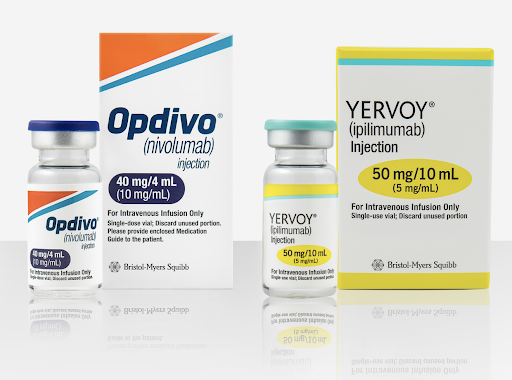FDA Approves Opdivo and Yervoy as First New Treatment for Mesothelioma in 16 Years

by Eleanor Ericson, RN
The Food and Drug Administration has approved a new treatment for the rare disease malignant pleural mesothelioma. The new treatment is two immunotherapy drugs working together as first line therapy to treat patients that are not surgical candidates. This is the first new drug therapy approved by the FDA since 2004 when Cisplatin and Pemetrexed were approved as chemotherapy options for patients with mesothelioma.
The two drugs are Opdivo (Nivolumab) and Yervoy (Ipilimumab). The phase three clinical trial that was conducted internationally used these two immunotherapy drugs that work as checkpoint inhibitors. Together, they work on the T-cells to identify the tumor cells and target them. T-cells are part of the immune system; they are specific white blood cells. The T-cells’ role is to circulate looking for foreign substances. Opdivo helps the T-cells discover the tumor cells, and then Yervoy activates and proliferates the T-cells to destroy the tumor.
In the clinical trial named CheckMate 743 which began recruiting in 2015, Opdivo 360mg was administered by IV every three weeks. Yervoy, 1mg/kg IV was administered every 6 weeks. They were administered together for up to six cycles or to disease progression, unacceptable toxicity, or completion of two years of therapy.
There are side effects to this therapy. The most common ones are fatigue, musculoskeletal pain, rashes, diarrhea, dyspnea, and nausea. These drugs can also cause immune mediated pneumonitis, colitis, and hepatitis. These reactions can be serious and life threatening.
This combination of drugs has proven to extend overall survival of patients that are diagnosed with malignant pleural mesothelioma that are not candidates for surgery. Of the nearly 3,000 patients diagnosed a year in the United States, approximately 20 to 30 percent are deemed surgical candidates. Up to this point the non-surgical patients were offered standard chemotherapy using Cisplatin and Pemextred with limited success.
There are three main cell types of malignant pleural mesothelioma. Epithelioid is the major type making up around 60 to 80 percent, sarcomatoid is less than 10 percent, and mixed or biphasic around 10 to 15 percent. The most resistant to treatment has been sarcomatoid and mixed cell types.
This new therapy is particularly encouraging for patients with sarcomatoid and mixed cell type. The two year survival of patients with this new therapy was 38 percent compared to 8 percent after two years with standard chemotherapy. The median survival was 18.1 months as compared with the current median survival of 8.8 months.
This is encouraging news and hopefully the beginning of more approvals and longer survival leading to a cure!




